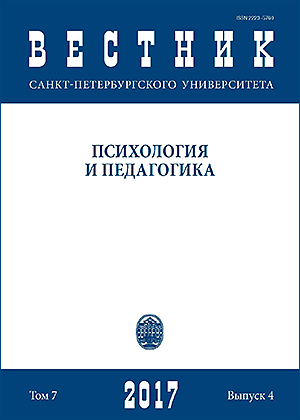Особенности когнитивного развития детей в домах ребенка с различным социальным окружением
DOI:
https://doi.org/10.21638/11701/spbu16.2017.405Аннотация
В современных социально-экономических условиях в Российской Федерации (РФ) основными учреждениями для проживания детей-сирот в раннем возрасте являются дома ребенка (ДР). В то же время исследования показали, что дети, воспитывающиеся в учреждениях, демонстрируют отставание в области когнитивного функционирования. Один из путей решения проблемы — программы вмешательства, направленные на улучшение условий детских сиротских учреждений. В РФ ключевым исследованием по изменению условий ДР стало лонгитюдное исследование международной группы ученых в Санкт-Петербурге (The St. Petersburg — USA Orphanage Research Team, 2008), где в одном из ДР было создано семейное социальное окружение. С целью изучения влияния семейного социального окружения в ДР на уровень когнитивного развития детей мы провели сравнительное исследование в двух ДР Санкт-Петербурга: традиционном ДР и ДР с семейным социальным окружением. Для оценки уровня когнитивного развития детей были использованы три невербальные шкалы методики MSEL (The Mullen Scales of Early Learning, 1995) и две коммуникативные шкалы методики VABS (The Vineland Behavior Adaptive Scales, 2005). Выборка состояла из 25 детей в возрасте от 5 до 28 месяцев: 13 детей из ДР (А) и 12 детей из ДР (Б). Дети, проживающие в ДР с семейным социальным окружением, показали значимо более высокие результаты при оценке уровня общего когнитивного развития (F=5,09, p=0,03), а также экспрессивной коммуникации (F=12,91, p=0,00) и зрительного восприятия (F=6,54, p=0,01). Полученные результаты демонстрируют необходимость создания семейного окружения в сиротских учреждениях для психического развития и здоровья детей.
Ключевые слова:
когнитивное развитие, ранний возраст, дома ребенка, социальное окружение, депривация
Скачивания
Библиографические ссылки
Загрузки
Опубликован
Как цитировать
Выпуск
Раздел
Лицензия
Статьи журнала «Вестник Санкт-Петербургского университета. Психология» находятся в открытом доступе и распространяются в соответствии с условиями Лицензионного Договора с Санкт-Петербургским государственным университетом, который бесплатно предоставляет авторам неограниченное распространение и самостоятельное архивирование.




